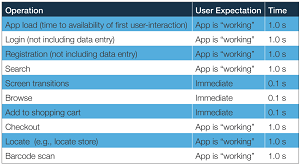News
Firm Seeks Overhaul of Mobile App Metrics To Improve User Experience
- By David Ramel
- June 14, 2016
Mobile app analytics firm Apteligent Inc. believes developers are focusing on the wrong metrics when it comes to improving the UX.
Typically, developers and mobile teams track business-oriented key performance indicators (KPIs) -- such as new customer acquisition, engagement, churn, revenue and crash rates -- while they should focus more on serving users, said Apteligent, which used to be known as Crittercism.
"None of these metrics, with the exception of crash rate, ties directly to how well the app enables a user to satisfy a need or desire," Apteligent said in a statement last Friday. "To get a detailed picture of what drives business KPIs on mobile, mobile teams need the 'why' behind the 'what.' "
To that end, the company has published a white paper outlining a new class of user-centric app performance metrics, along with guidelines and best practices for tracking those metrics.
For one thing, says the white paper, titled "Optimize Mobile KPIs with User-Centered App Metrics," app metrics should focus on the human side of things, gauging emotions like frustration and annoyance.
A basic framework that categorizes important issues from a user perspective would be:
-
Failure: the app crashes, freezes, or an error prevents completion of a user's
flow in the app and there is no workaround.
- Frustration: the app is slow to start, operations are much slower than
expected, or a key operation fails but can be retried.
- Annoyance: the app drains battery noticeably faster than others or an
operation sometimes takes longer than expected.
For practical, hands-on advice, Apteligent advises developers to set a higher bar for app responsiveness, instead of relying upon accepted industry norms.
Citing research by UX expert Jakob Nielsen, Apteligent said "instantaneous" operations should take no more than 0.1 seconds. To be perceived as "working," an operation should conclude within 1 second. "If it takes longer, the user's flow of thought is interrupted and the user begins to get impatient," the white paper said.
The company summarized these insights about user expectations about event latency in the following graphic:
 [Click on image for larger view.]
Acceptable Response Times for User Actions (source: Apteligent)
[Click on image for larger view.]
Acceptable Response Times for User Actions (source: Apteligent)
"Will all of your users abandon your app if you don't hit these targets?" the paper asked. "Of course not. However, some of them will abandon the operation they sought to perform -- searching for a fight, viewing a shopping cart, loading a game at the bus stop -- abandonment that costs you revenue and damages your brand. Some of them will stop using your app. The longer your app takes to deliver basic responses and the more friction your app creates for your users, the more you will lose."
The threat of losing customers is even more dire in view of continuing news reports like "23 Percent of Users Abandon Apps After One Use" and "App Download Figures Are Declining Worldwide."
"Your mobile business success depends critically on a strategy that is user-centered," Apteligent said. "Nearly 30 percent of consumers indicate that they will consider leaving a brand solely due to a poor app experience. Mobile users' attention spans are short and instant gratification is the expectation. They demand to get what they want, in the moment, wherever they are."
Apteligent said it will continue to update its app metric benchmarks and guidance as the mobile ecosystem evolves. It provides a variety of updated app metric data and charts for iOS and Android devices here.
About the Author
David Ramel is an editor and writer at Converge 360.